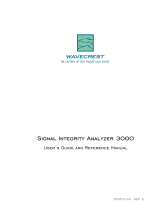Page is loading ...

GEInspectionTechnologies.com
Ultrasonics
GE Inspection Technologies
2004 General Electric Company. All rights reserved GEIT-20036GB (09/04)
We reserve the right to technical modifications without prior notice.
A PLUS for the USLT 2000
The software program FFT is an additional
module for the ultrasonic test system
USLT 2000 that can be easily installed
as an optional „Plug-In“. This additional
software extends the range of functions
of the USLT 2000; new fields of applica-
tion are opened up.
In combination with the modern com
-
puter technology and the FFT method
(Fast Fourier Transform), a fundamental
method of signal processing, ultrasonic
signals can also be displayed and evalu-
ated online within the frequency range.
This spectrum analysis is used for the
nondestructive characterization of mate-
rial and reflector properties.
Krautkramer SoftwareProgram
Module FFT
... for the characterization of material and reflector properties
The method
The method makes use of the fact that
every ultrasonic echo is a convolution
product of the properties of the acoustic
transducer, of the material, and of the re-
flector, among other things. If the frequency
spectrum of an acoustic transducer is
known - which can likewise be determined
by means of the program -, the frequency
shift measurement enables conclusions to
be drawn with regard to the reflector and
the material.
The FFT software shows the A-scan’s
frequency spectrum in the right-hand
section of the window. The evaluation
parameters are displayed below it: for
the time signal the pulse duration, for
the frequency spectrum the peak and
center frequency, and the bandwidth.
The applications
In addition to the reflector characteriza-
tion - for example the distinction between
flat or planar and curved reflectors - the
FFT module makes a material characteri-
zation possible, for example:
• in materials testing on metals: metall
-
urgical properties
• in materials testing on plastics:
embrittlement, consistence, matrix
characterization of composite
materials
• in medical applications: mineral con
-
tent of bones or osteoporosis
• in foodstuff control: detection of
sedimentation, gelation, impurities,
temperature effect
/

